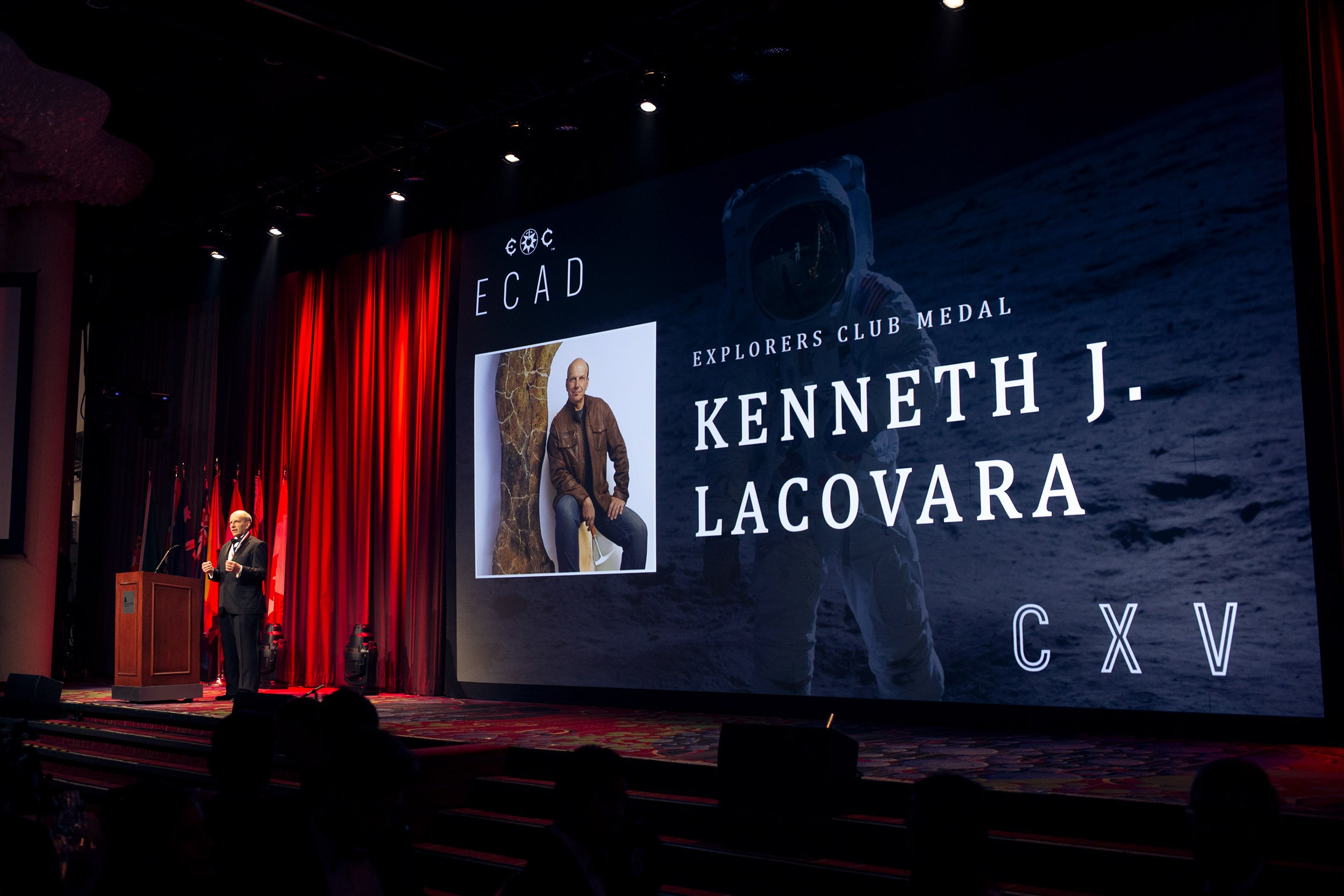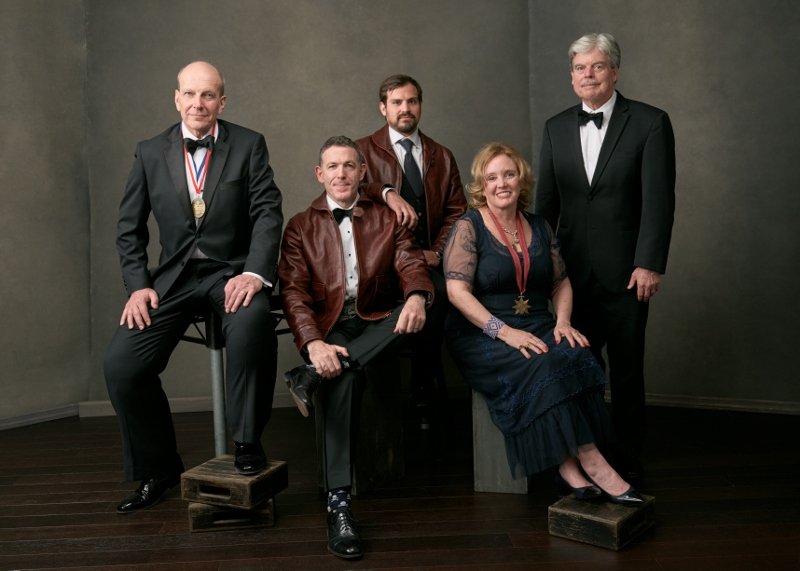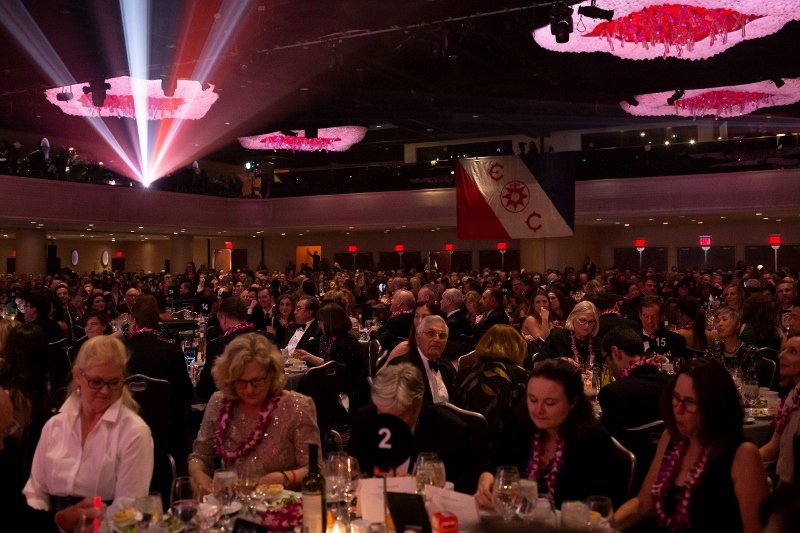Dr. Kenneth Lacovara, dean of the School of Earth & Environment, receives The Explorers Club Medal
Dr. Kenneth Lacovara, dean of the School of Earth & Environment, receives The Explorers Club Medal

It’s an achievement of a lifetime, one awarded to a very select group of scientists and explorers who’ve lived very big lives.
Far rarer than even Olympic gold, The Explorers Club Medal, the greatest honor bestowed by the world-renowned, New York-based Explorers Club, recognizes “extraordinary contributions directly in the field of exploration, scientific research, or to the welfare of humanity.”
On Saturday, March 16, Dr. Kenneth Lacovara, founding dean of Rowan’s School of Earth & Environment, director of the Jean & Ric Edelman Fossil Park of Rowan University and discoverer of Dreadnoughtus schrani, the largest fossilized dinosaur ever unearthed, received The Explorers Club Medal during a weekend-long celebration in Manhattan.
The highlight of the weekend was the 115th annual Explorers Club Annual Dinner Saturday evening, but the celebration, which began Thursday and concluded with a brunch Monday morning, feted a wide range of explorers. Included prominently among them was moonwalker Edwin “Buzz” Aldrin and command module pilot Michael Collins--the surviving crew members of the 1969 Apollo 11 mission, the first to land on the Moon.
 “I’m honored to be in their company,” said Lacovara, still heady from the weekend, on his return to southern New Jersey after receiving the medal. “It’s a very rarified air, akin to being on the TED mainstage. I’m humbled to be added to the list of recipients that includes so many of my childhood heroes.”
“I’m honored to be in their company,” said Lacovara, still heady from the weekend, on his return to southern New Jersey after receiving the medal. “It’s a very rarified air, akin to being on the TED mainstage. I’m humbled to be added to the list of recipients that includes so many of my childhood heroes.”
Lacovara was, in fact, a mainstage TED Talk speaker. His presentation "Hunting for dinosaurs showed me our place in the universe," was one of the Top Ten TED Talks of 2016 and it has since been viewed more than 1.65 million times.
He’s a popular, international speaker and best-selling author whose 2017 book, Why Dinosaurs Matter (Simon & Schuster/TED Books), earned a prestigious Silver Nautilus Book Award.
Digging for dinosaurs and more
In addition to his work excavating Dreadnoughtus in Patagonia at the southern tip of South America, Lacovara has participated in major paleontological digs around the world.
In western China, he and his colleagues discovered multiple remains of Gansus, a 115-million-year-old bird that filled a vital link in the study of bird evolution. In the Gobi Desert, he was a member of the team that discovered the strange, sloth-like plant-eater Suzhousaurus.
In Egypt, Lacovara co-led a series of expeditions to the isolated Bahariya Oasis, deep within the Sahara Desert, where the team made the first new dinosaur discovery in Egypt in nearly a century, the giant plant-eater Paralititan stromeri.
Co-author of the book The Lost Dinosaurs of Egypt, Lacovara was thrice included in Discovery magazine’s list of the 100 Top Science Stories of the Year and was featured in Men’s Journal as a member of “The Next Generation of Explorers.”
At Rowan, Lacovara is applying high technology to the study of fossils including 3D laser scanning, CT scanning, 3D printing, robotics, and techniques from medical modeling and molecular biology.
All of which contributed to Lacovara, an elected fellow at The Explorers Club, being chosen as the organization’s 2018 Explorers Club Medal honoree.
Idolized Apollo astronauts
Following the big weekend, Lacovara recalled how, amid the space race of the late 1960s, he revered the NASA astronauts who, in New York, he’d socialized with, shared speaking engagements with and was honored beside.
“They were my childhood heroes,” he said. “I remember going into a record store with my mother in 1970 where she was going to buy me my first record album. In my hand was Let It Be, the great Beatles record, and then I saw Man On The Moon, a recording of the Apollo 11 mission. I left with Man On The Moon.”
Addressing thousands of guests in the Broadway Ballroom of the Marriott Marquis Times Square Saturday night, Lacovara spoke of the wonder of televised space travel he saw as a kid and the possibilities of exploration he felt because of the Apollo missions.
"When I saw the Apollo astronauts venture forth and explore a new world, I had a sense, as a young boy, that I would grow up in a new age—in the Space Age. And it filled me with hope, and a desire to get out there and explore," he said. “And I did. But my first vessel was not a spaceship – it was a backyard telescope. And I found that with that instrument, I could time travel. I could view the light of ancient stars and even ancient galaxies. And then I discovered another way to visit the past—not with the light of ancient stars, but with things I could buy at the hardware store. I could time travel with a shovel, and a pickaxe, and a hammer, back to the many ancient worlds that have been our Earth.”
Lacovara, a 1984 Rowan alumnus who graduated with a degree in geography, earned his master’s degree in physical geography from the University of Maryland and his doctorate in geology from the University of Delaware.
He’s the recipient of numerous honors, including Rowan’s Distinguished Alumnus Award in 2002, has given hundreds of invited talks and is frequently called on by media for scientific comment on a broad range of issues.
Though he’s clearly best known for his work uncovering the distant past, he said he, and every other scientist to take The Explorers Club stage over the weekend, spoke urgently about Earth’s future and the existential threat of climate change.
“We’ve seen the glaciers retreating,” he said in accepting The Explorers Club Medal. “We’ve seen the coral reefs collapsing. We’ve seen the seas rising and the forests being cut down, and we’ve seen Earth’s biodiversity disappearing before our eyes. And some of us have even seen the fragility of our planet from space. We’ve seen these things, and the people in this room have both the knowledge and the power to do something about it – to catalyze change, to implement solutions, and to help save for our children, this planet—the only home we’ve ever known.”
Lacovara wished to inspire the attendees to make a difference, to change the world. “That would be the greatest legacy of The Explorers Club.”
View the full list of recipients of The Explorers Club Medal.